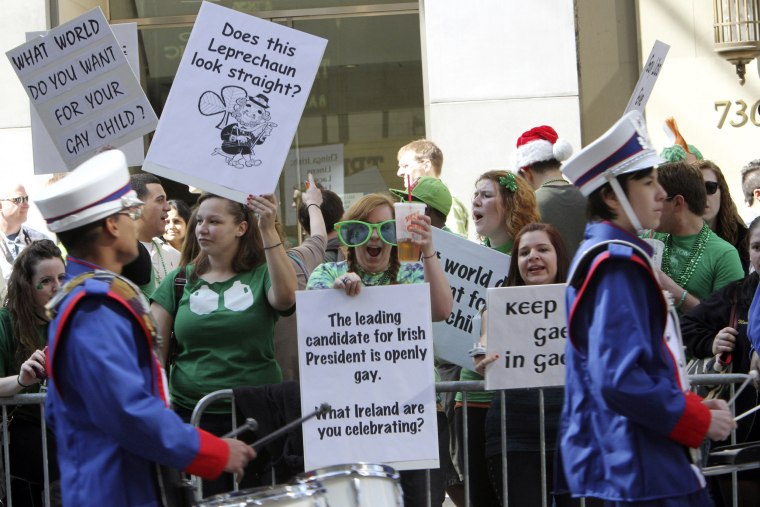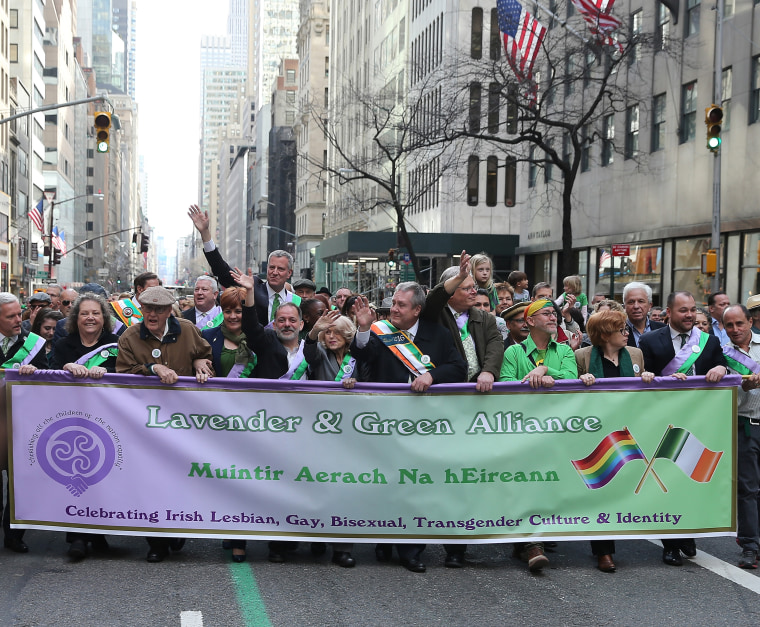Emmaia Gelman has spent the past 20 St. Patrick's Day holidays protesting on Fifth Avenue. But this year, she and her fellow members of Irish Queers will skip the parade for the first time and attend an immigrants' rights protest instead.
The LGBTQ group, long a fixture of the New York City parade, plans to picket outside of a raucous party for Irish police officers in the Emerald Society that takes place on Pier 90.

The protest comes amid heightened worries around President Donald Trump’s executive order temporarily restricting entry to the United States by refugees and over the administration’s policies on undocumented immigrants.
"We have an Irish community here that pays attention to the plight of Irish immigrants without applying that same lens to all immigrants," Gelman said. "While at the same time Irish cops are going around arresting immigrants of color and leading them to deportations."
Irish Queers, made up of Irish-Americans as well as recent immigrants, long protested the St. Patrick’s parade that excluded them. Year after year, Irish Queers applied to march alongside the roughly 200,000 NYC St. Patrick's Day Parade marchers. Year after year, they were turned down and shut out.
In 2016, a gay Irish group was allowed to march for the first time in 20 years, but while the Lavender and Green Alliance was welcomed in, Irish Queers saw its application denied once again.
"They were never going to let us march," Gelman told NBC News. "They hate us."
Lavender and Green invited Irish Queers to sneak into their contingent last year, and they did. Having finally marched in the parade (sort of), the group is moving on.
"The parade hasn’t really changed," Gelman said. "To me, the parade still feels like a conservative, religious-right parade and not really an Irish community parade. I’m glad the battle is over, and it seems like there’s progress, but it doesn’t feel like home to me."
While Irish Queers won't be at the parade this year, hundreds of police officers will — marching with the Emerald Society and a dozen other NYPD groups and neighboring departments. Many of those officers will be bussed from the parade to the Emerald Society party on the pier, where they will be greeted by protesters calling for sympathetic response to the fear rippling through immigrant communities — including the undocumented Irish community.

New York City Mayor Bill de Blasio, a Democrat, has said that police will not act as immigration agents, and said it is a longstanding police policy that officers do not make arrests or inform federal authorities based on immigration status alone.
Irish Queers is protesting Friday, Gelman said, because they are upset that some NYPD officers have spoken out in favor of Trump's immigration policies and Immigration and Customs Enforcement (ICE) enforcement actions earlier this year.
In late February, NYPD Sergeant's Union head Ed Mullins criticized the concept of sanctuary cities in opposition to a Police Commissioner letter instructing cops to avoid immigration enforcement, the New York Daily News reported.
"Make no mistake about it, the members of law enforcement in the NYPD want to cooperate with ICE. I speak to cops every day," said Mullins, who called enforcing immigration laws "a moral obligation" for police officers.
Gelman said that cops with Irish roots, most of whom are marching this Friday, should remember that their ancestors came to the U.S. as immigrants fleeing violence and hunger.
"The movement to demand the safety of immigrants demands the safety of all immigrants," Gelman said.
Gelman said Irish-Americans have "one foot in the world of policing and one foot in the world of immigrant rights."
One Irish-born retired NYPD detective interviewed for a 2015 Irish Central article confessed that he spent years in the U.S. as an undocumented immigrant and recalled "approximately 50 people from Ireland in the police academy" when he joined the ranks in the 1980s.
That's a large number for a relatively small immigrant population. According to the U.S. Census Bureau, 125,022 Irish-born immigrants lived in the U.S. in 2014.
The Coalition of Irish Immigration Centers in 2014 estimated about 50,000 undocumented Irish nationals were living in the U.S. — meaning, if the numbers are correct, over a third of Irish-born U.S. residents were here illegally that year.